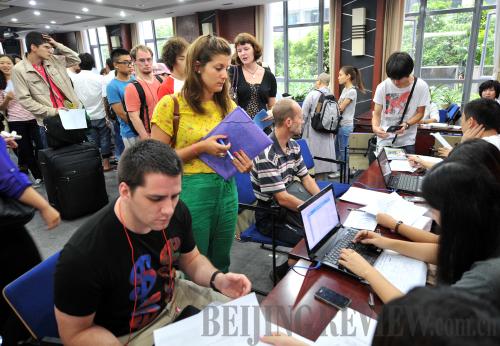|
 |
|
A NEW START: Foreign freshmen line up to register at Nanjing University, east China's Jiangsu Province on September 3, 2012 (SUN CAN) |
In some ways, grade-school education in China and the United States couldn't be more different. American parents enviously view the high-test scores in math and science achieved at Chinese schools, while Chinese educators admire the critical thinking and problemsolving skills displayed by American students. But while the methods may be different, both countries have committed to improving and broadening their education system and are looking halfway around the world for best practices.
For two days in early April in Boston, state and provincial education leaders from China and across the United States met to share ideas and discuss efforts to improve teacher quality and performance at weak or underachieving schools. The forum was held by the U.S. Department of Education and Chinese Ministry of Education.
Hao Ping, Vice Minister of Education, attended the forum and delivered a speech at the opening ceremony. "Education dialogue is an important measure of exchange and cooperation between China and the United States," Hao said, adding that people-to-people exchange in the education field of the two countries has strong potential and broad prospects at the provincial and state level.
Backed by the Council of Chief State Schools Officers, the Asia Society and Harvard University, Mitchell Chester, Massachusetts Commissioner of Elementary and Secondary Education, hosted leaders from nine provinces and 13 states to build on and deepen a dialogue that started in Beijing last year, said Maureen McLaughlin, Director of International Affairs at the U.S. Department of Education.
"While education efforts are huge and highly diverse between and within the United States and China, there are many common challenges. The challenges—especially how to educate all children to high levels—and the desire to learn from each other bring us together. Learning from other countries to improve U.S. education and advance U.S. international priorities is a key objective of the department's international strategy," writes McLaughlin.
"One consensus we have reached through this conference is the government's responsibility for education equalization, which refers to the balance between different regions such as the west and the east, during the stage of compulsory education," Cen Jianjun, Education Counselor of Chinese Consulate General in New York, told Beijing Review.
"Most of the delegates agreed that China and the United States have much to learn from each other on education. China has rigorous educational standards and a much tighter curriculum than the United States, which helps improve instructional quality in schools, especially in math and science. The United States is the leading country all around the world in higher education. Its educational system encourages creativity, which makes the United States one of the most advanced countries in terms of technological innovation," Cen added.
| 